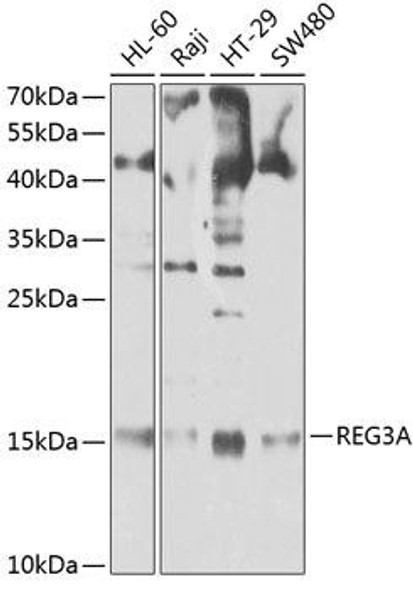Description
REG3A Monoclonal Antibody (CPAB0734)
The REG3A Polyclonal Antibody (CPAB0734) is a valuable tool for researchers studying REG3A, a secreted protein with roles in intestinal homeostasis and immune response regulation. This rabbit-derived antibody is highly specific to human REG3A and is validated for use in Western blot applications. By binding to REG3A, the antibody enables precise detection and analysis of the protein in a variety of cell types, making it an essential component for studies in gastrointestinal research, inflammatory diseases, and immune system functioning.
REG3A is known for its antimicrobial properties and its ability to maintain the integrity of the intestinal barrier, making it a crucial player in gut health and immunity. Dysregulation of REG3A has been implicated in inflammatory bowel diseases, metabolic disorders, and microbial infections, highlighting its importance in maintaining overall health. With the REG3A Polyclonal Antibody, researchers can gain deeper insights into the function of REG3A and its potential therapeutic implications in various disease contexts.
| Product Name: | REG3A Antibody |
| Product Sku: | CPAB0734 |
| Size: | 2μg |
| Host Species: | |
| Immunogen: | |
| Clone: | |
| Reactivity: | Other Polyclonal bodies |
| Applications: |
| Purification Method: | Immunoaffinity chromatography on a column with immobilized recombinant human REG3A. |
| Isotype: | |
| Background: | Pancreatitis-associated protein (PAP) is a secretory protein not normally expressed in healthy pancreas but highly induced during acute pancreatitis. While PAP has been shown to be anti-bacterial and antiapoptotic in vitro, its definitive biological function in vivo is not clear. Using antisepse oligonucleotides, inhibition of PAP expression significantly worsened pancreatitis in a rat model. During pancreatitis, PAP released by the pancreas could mediate lung inflammation through induction of hepatic TNF- alpha expression and subsequent increase in circulating TNF-alpha. PAP is activated in primary liver cancers. In normal liver, the protein is undetectable in normal mature hepatocytes and found only in some ductular cells, representing potential hepatic progenitor cells. PAP can be considered hepatic cytokine that combines mitogenic and anti-apoptotic functions regarding hepatocytes, and consequently acts as a growth factor in vivo to enhance liver regeneration. |
| Synonyms: | Regenerating islet-derived protein 3 alpha, Reg III-alpha, Pancreatitis-associated protein 1, REG3A, HIP, PAP, PAP1, REG3, INGAP, PAP-H, PBCGF, REG-III. |
| Storage Buffer: |







